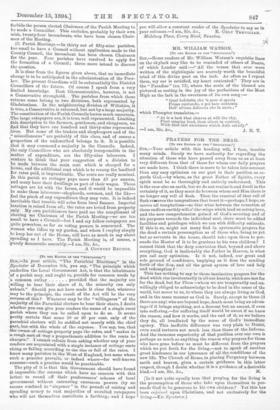PRAYERS FOR THE DEAD.
[To THE EDITOR OF THE SPEOTATOR."3
Sin,—Yonr article with this heading will, I fear, trouble many minds. Surely we have authority for regarding the situation of those who have passed away from us as at least very different from that of those for whom our daily prayers are made here. I think there is more to be taken into account than any easy optimism on our part in their position as re- gards God,—by whom, as the great Father of Spirits, every spirit must be so thoroughly and entirely understood. This lathe ease also on earth, but we do not realise it and dwell in the certainty of it, as they must do between whom and Him there is no longer any veil of flesh. Then the removal of that veil of flesh removes the temptations that beset it—perhaps,I hope, re. moves all temptations—so that what between the cessation of these endless earthly will-o'-the-wisps which lead us astray here, and the new comprehension gained of God's meaning and of his purposes towards the individual soul, there must be added facilities and privileges which we Can with difficulty estimate. If this is so, might not many find in systematic prayers for the dead a certain presumption as of those who, being as yet but as servants in the house, should take upon them to per- suade the Master of it to be gracious to his own children? I cannot think that the deep conviction that, beyond and above everything, God is inalienably the Father in Heaven, is what you call easy optimism. Is it not, indeed, our great and sole ground of confidence, implying as it does the sending forth of the Son, and all the great system of love and help and redemption P This bas nothing to say to those instinctive prayers for the dead which rise involuntarily in all our hearts, which are not for for the dead, but for Them—whom we are temporarily and un- willingly obliged to acknowledge to be dead in the sense of the world, but never to us, to whom they are always living as God, and in the same manner as God is. Surely, except to those (if there are any) who are beyond hope, death must bring an advan- tage if it brings anything, not a descent but an ascent, if even into suffering,—for suffering itself would be sweet if we knew the reason, and how it works, and the end of it, as we believe they do, all irradiated by the sense of God's immediate agency. This ineffable difference was very plain to Dante, even amid tortures not much less than those of the Inferno, And the immense superiority of that position over our own is perhaps as much as anything the reason why prayers for those who have gone before us must be different from the prayers which we put forth for the living,—not to speak of another great hindrance in our ignorance of all the conditions of the new life. The Church of Rome, in placing Purgatory between earth and heaven, gives a certain guidance in this latter respect, though I doubt whether it is a guidance of a desirable
[Is it not quite equally true that praying for the living is the presumption of those who take upon themselves to per- suade God to he generous to his own children ? Yet this has been enjoined upon Christians, and not exclusively for the living.—En. Spectator.]








































 Previous page
Previous page